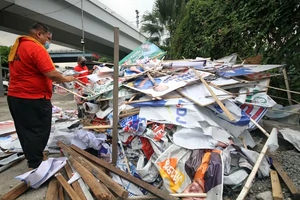👉 What is ‘Oplan Baklas’? How will it affect campaign materials this election season?
🔥 Find out what the Commission on Elections (COMELEC) is enforcing and what candidates, supporters, and voters need to know!
Read on for the full breakdown of the policy, legal basis, and its impact on the election process.

Advertisement:


Table of Contents
🛑 What Is ‘Oplan Baklas’?
‘Oplan Baklas’ is a nationwide initiative led by the Commission on Elections (COMELEC) aimed at removing illegal campaign materials throughout the official election period.
🔹 The operation targets campaign posters, banners, tarpaulins, and other promotional materials that:
✅ Violate election laws
✅ Exceed COMELEC’s prescribed size limits
✅ Are posted in prohibited areas
This initiative ensures a fair election process by promoting equal campaign opportunities while preventing environmental and safety issues caused by excessive materials.
📌 Authority Behind ‘Oplan Baklas’
The implementation is based on Republic Act No. 9006, also known as the Fair Elections Act, which regulates campaign materials to ensure fair play among candidates.
⚖️ Legal Guidelines for Campaign Materials Under ‘Oplan Baklas’
Under COMELEC Resolution No. 10730, the following rules apply to all political candidates and parties:
| Regulation | Details |
|---|---|
| 📏 Size Limit | Posters should not exceed 2 x 3 feet in size |
| 📍 Allowed Locations | Common poster areas, private properties (with consent) |
| 🚫 Prohibited Locations | Public places (streets, bridges, waiting sheds, trees, electrical posts, schools, etc.) |
| ❌ Restricted Materials | Oversized tarpaulins, non-eco-friendly plastics, streamers beyond the legal size |
| ⚠️ Who Can Remove Materials? | Only COMELEC, DPWH, and authorized agencies can conduct removals |
🚨 Warning to Candidates:
Violations may lead to fines, disqualification, or legal action against those who fail to comply.
🛠️ How ‘Oplan Baklas’ Will Be Implemented
COMELEC has outlined a strict enforcement plan throughout the election period:
🔍 Phase 1: Monitoring & Identification
✅ Inspection of campaign materials across different cities and municipalities
✅ Identification of illegal posters in public areas and government properties
✅ Coordination with local officials and enforcement agencies
✂️ Phase 2: Immediate Removal of Illegal Materials
✅ Mobilization of teams consisting of COMELEC personnel, MMDA, PNP, and DPWH
✅ Confiscation of oversized and misplaced campaign materials
✅ Issuance of warnings and violations to candidates
📢 Phase 3: Continuous Compliance Checks
✅ Routine patrols and removal of any newly installed unlawful materials
✅ Public awareness campaigns to educate candidates and supporters
✅ Filing of cases against persistent violators
🔎 Who Will Be Affected by ‘Oplan Baklas’?
🚨 Political Candidates & Parties – Must ensure their campaign materials comply with the law to avoid penalties.
🚨 Supporters & Private Individuals – Private property owners must give consent before campaign materials are placed.
🚨 Local Governments – Will assist in enforcing the removal of illegally placed materials.
🚨 Voters – Must remain vigilant and report violations to COMELEC.
✅ How to Avoid Violating ‘Oplan Baklas’?
- Ensure all campaign materials are within the legal size limits.
- Do not place posters on public properties.
- Get proper permits before displaying materials.
- Remove and relocate materials if notified by COMELEC.
💬 Public Reactions & Political Debate
The strict enforcement of ‘Oplan Baklas’ has sparked mixed reactions from various groups:
🗣️ Supporters of ‘Oplan Baklas’ Say:
✔️ Fair Election Practices – It prevents unfair advantages for wealthier candidates.
✔️ Environmental Protection – Limits excessive waste from campaign materials.
✔️ Public Safety – Avoids hazards caused by cluttered posters and banners.
🤔 Critics Argue:
❌ Limits Free Expression – Some believe it violates freedom of speech for political supporters.
❌ Selective Implementation? – Concerns over bias in the enforcement of rules.
❌ Effect on Small Campaigns – Larger, wealthier campaigns can still dominate digital platforms.
📢 What do you think? Should ‘Oplan Baklas’ be stricter or more lenient? Let us know in the comments below! 👇
🤔 FAQs About ‘Oplan Baklas’
What campaign materials are allowed?
Only properly-sized posters placed in COMELEC-approved areas or private property (with permission).
What happens if a candidate violates ‘Oplan Baklas’?
COMELEC may remove the materials, issue fines, or disqualify candidates from running in extreme cases.
Can individuals file complaints about illegal campaign materials?
Yes! Citizens can report violations to COMELEC offices or local election supervisors.
Does ‘Oplan Baklas’ apply to digital or social media campaigns?
No, ‘Oplan Baklas’ strictly applies to physical campaign materials, but COMELEC regulates digital advertising separately.
⚠️ Disclaimer
Pinoy Trending informs that this article is based on COMELEC’s official guidelines and publicly available election laws. Policies may change, so it is recommended to check with COMELEC for official updates.
For legal and election-related concerns, refer to:
✅ COMELEC Official Website
✅ GMA News
✅ Philippine Daily Inquirer
🤖 AI Disclosure Statement
This article was researched and written with AI-assisted technology to ensure accuracy, optimization, and readability.
🌟 Final Thoughts: Ensuring Fair & Orderly Elections
✅ ‘Oplan Baklas’ serves an important role in ensuring fair election practices, but its enforcement remains a topic of debate.
📢 Should COMELEC make stricter rules or relax some restrictions? Share your opinions below! 👇
🔔 Follow us for more election updates! 🗳️✨
Josh is a seasoned content writer and journalist with over 15 years of experience creating impactful, accurate, and engaging content across industries like technology, healthcare, finance, and media. He specializes in translating complex topics into clear, accessible narratives and excels in technical documentation, editorial writing, and marketing materials.
A skilled journalist, Josh delivers in-depth features and articles that resonate with readers. Known for his attention to detail, research skills, and reliability, he is dedicated to producing high-quality content that informs, educates, and inspires.


